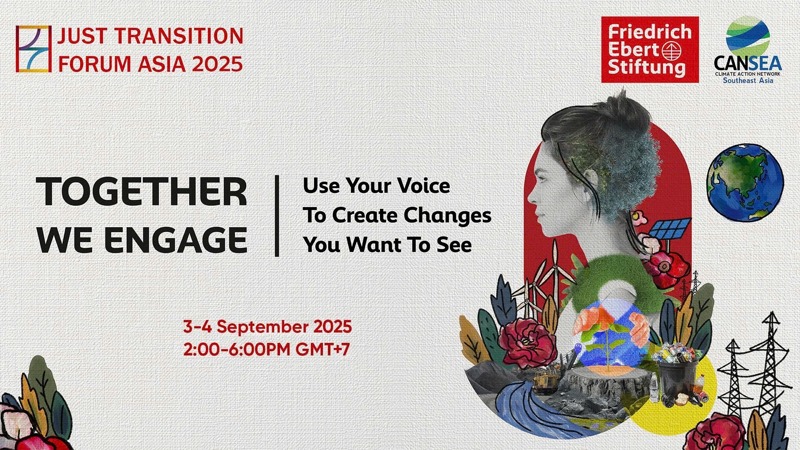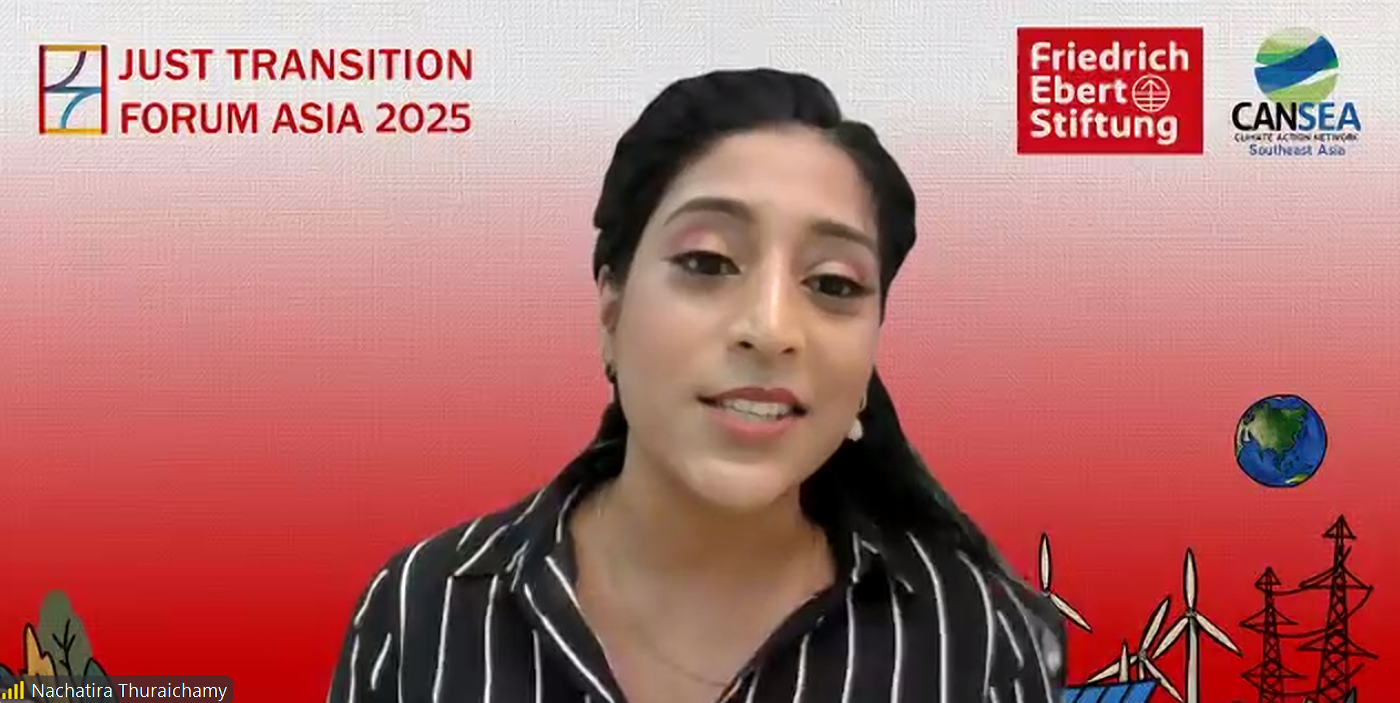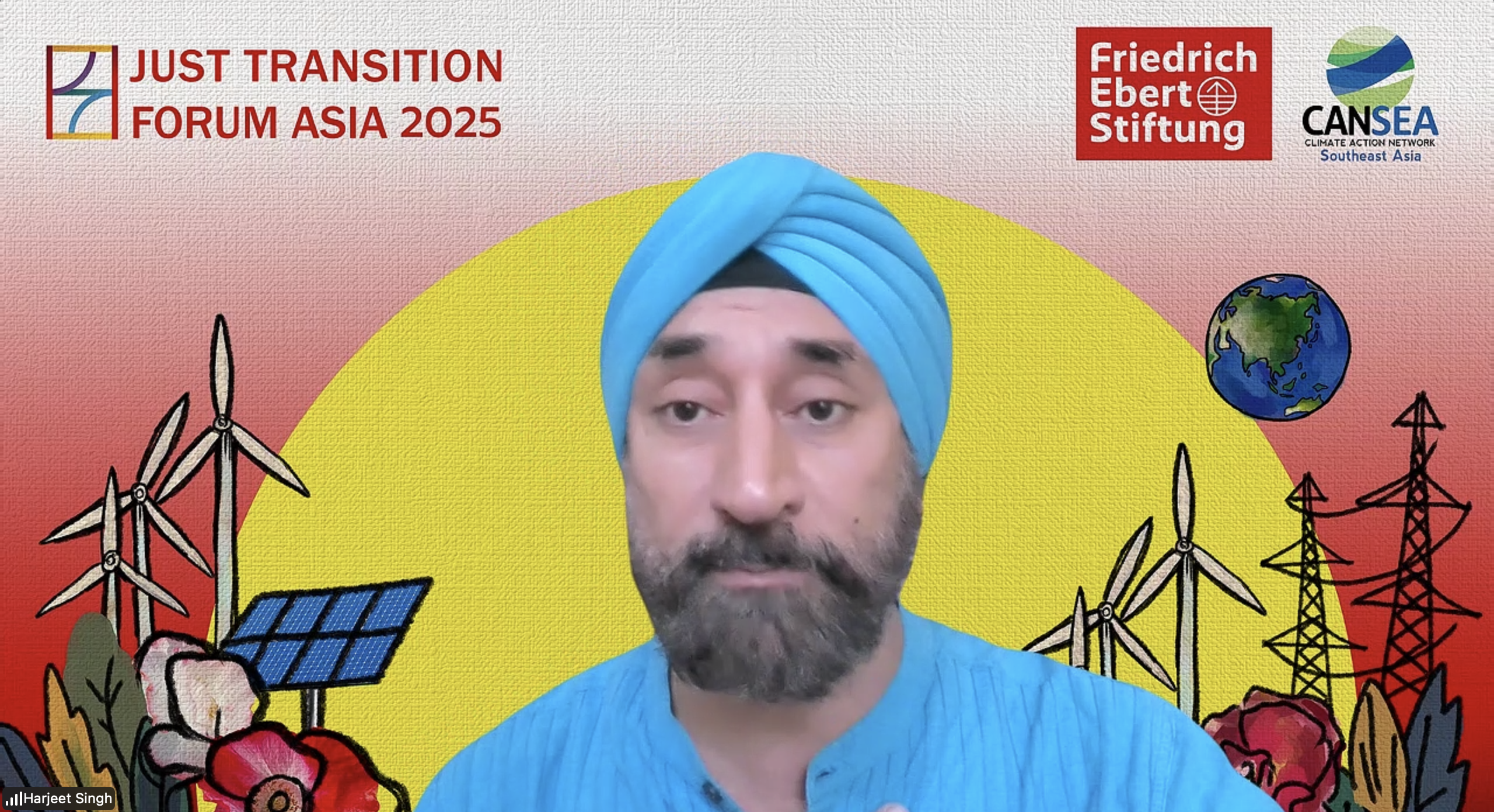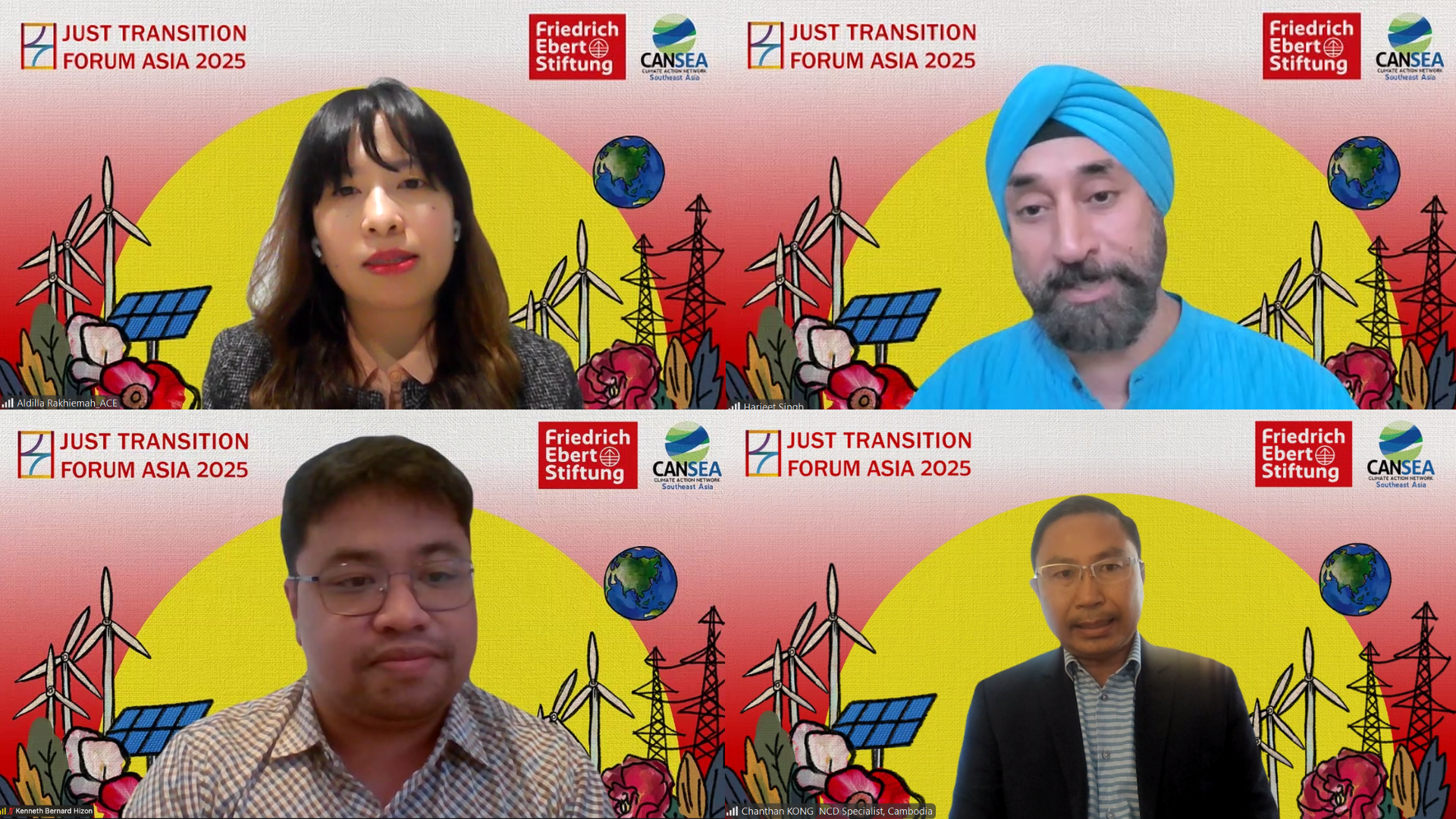Online, 4 September 2025

Photo 1. Poster of the Event: “Just Transition Forum Asia 2025: Just Energy Transition Lab for Energy Cooperation in ASEAN”
The ASEAN Climate Change and Energy Project Phase II (ACCEPT II) participated in the Just Transition Forum Asia 2025 through the panel “Just Energy Transition Lab for Energy Cooperation in ASEAN.” Hosted by the Climate Action Network Southeast Asia (CANSEA) and supported by Friedrich Ebert Stiftung (FES), the panel brought together experts to discuss how regional collaboration can accelerate a shift away from fossil fuels while ensuring equity and resilience for communities.

Photo 2. The session was opened by Ms. Nachatira Thuraichamy, Senior Project Coordinator Influencing Just Energy Transition in SEA Project, Climate Action Network Southeast Asia (CANSEA).
The discussion was moderated by Ms. Nachatira Thuraichamy from CANSEA’s Influencing Just Energy Transition in SEA Project. Alongside Ms. Aldilla Noor Rakhiemah, the conversation was joined by other experts, namely Mr. Kenneth Bernard Hizon from the Asia Network for Peoples Energy and Oxfam Philippines, Mr. Kong Chanthan from the National School of Local Administration & Climate Resilience and NDC Partnership Specialist in Cambodia, and Mr. Harjeet Singh from the Fossil Fuel Non-Proliferation Treaty Initiative.

Photo 3. Ms. Aldilla Noor Rakhiemah, Senior Research Analyst and Project Manager of ACCEPT, set the scene on ACE and APAEC’s progress.
Representing the ASEAN Centre for Energy (ACE) and ACCEPT II, Ms. Aldilla Noor Rakhiemah, shared insights on the progress of the ASEAN Plan of Action on Energy Cooperation (APAEC): 2026-2030 to set the stage for the panel discussion. She introduced ACE to the participants and shared the sub-sector networks that support the organisation’s initiatives, such as the Head of ASEAN Power Utilities and Authorities (HAPUA) and the Renewable Energy Sub-Sector Network (RE-SSN).
Ms. Aldilla also introduced the APAEC as the region’s energy cooperation blueprint, which will have its new theme “Advancing Regional Cooperation in Ensuring Energy Security and Accelerating Decarbonisation for a Just and Inclusive Energy Transition,” set to be officially adopted at the 43rd ASEAN Ministers of Energy Meeting (AMEM) in 2025. The new cycle of APAEC will support an inclusive development process, mainstream just and inclusive energy transition (JIET) principles, strengthen evidence-based energy policymaking, and catalyse collaboration.

Photo 4. A presentation by Mr. Kong Chanthan, Vice Principal National School of Local Administration (NASLA) and NDC Specialist in Cambodia, on Cambodia’s NDC 3.0 submission.
The session was followed by a presentation delivered by Mr. Kong Chanthan, where he shared about Cambodia’s NDC 3.0 submission. Developed through broad consultations with stakeholders, including academia, local communities, and experts, the updated plan ensures that mitigation and adaptation strategies align with both national conditions and international targets. Among the key mitigation contributions is a target to raise renewable energy to 72% of the national energy mix, drawing on solar, hydropower, and other clean sources, alongside scaling up electric vehicle use to 35% of motorbikes and 5% of cars by 2035.

Photo 5. A presentation by Mr. Kenneth Bernard Hizon, Just Energy Transition Program Lead of Asia Network for Peoples Energy & Oxfam Pilipinas, on just energy transition.
Mr. Kenneth Bernard Hizon from Oxfam further highlighted that social movements present an opportunity to advance the energy transition in ways that are effective, just, and transformational. Oxfam emphasised that solutions must confront structural barriers, including gender power imbalances, to ensure a truly just transition. Oxfam also envisioned a balanced energy landscape in the Philippines and Southeast Asia, supported by stronger government, policy, and regulatory frameworks. In supporting this vision, Oxfam supported ACE in publishing A Guide for a Just and Inclusive Energy Transition.

Photo 6. Mr. Harjeet Singh, Strategic Advisor of Fossil Fuel Non-Proliferation Treaty Initiative, outlined ASEAN’s possible futures of clean energy transition.
Mr. Harjeet Singh shared that there are two possible futures for ASEAN; one that is built on fossil fuels, and one built on abundant, clean energy. He underscored that, for energy transition to work, finance flows must change course to renewables as ASEAN has vast untapped potential for renewable energy waiting to be developed. This is important as climate change has showed substantial human cost, such as public health concern due to pollution, and climate cost, where many Southeast Asian countries are very vulnerable to. He highlighted that energy transition is not just about climate action, it is about how to secure a stable, prosperous, and independent future for all, including economic, human, and climate health.

Photo 7. (From left to right, clockwise) Ms. Aldilla Noor Rakhiemah (ACCEPT), Mr, Harjeet Singh (Fossil Fuel Non-Proliferation Treaty Initiative), Mr. Kong Chantha (National School of Local Administration & Climate Resilience), and Mr. Kenneth Bernard Hizon (Oxfam Philippines) during the Q&A session.
During the question and answer (Q&A) session, Ramon Certeza of IndustriALL Southeast Asia and Oceania asked how workers and trade unions in the Asia-Pacific can engage more actively in the APAEC drafting process beyond simply providing feedback. In response, Ms. Aldilla noted that workers and unions are not directly represented in the drafting committee. However, there are opportunities to contribute through national and international channels, as well as regional workshops that can capture grassroots perspectives. She emphasised that capacity building is essential to help bridge the ASEAN Secretariat with vocational institutions and strengthen workers’ role in shaping the energy transition.
The discussion also touched on the role of oil and gas in Southeast Asia’s energy transition. In this regard, Ms. Aldilla emphasised that national oil and gas companies should be seen as partners, not obstacles, noting that NOC such as PTT, Petronas and Pertamina already have net-zero targets and the capacity to scale clean energy. She added that with regional cooperation in reskilling, these companies could help ensure a just and inclusive transition.
Concluding the panel, it is understood that a just energy transition in ASEAN is not only about shifting energy systems, but also about centering people in decision-making processes. By fostering regional collaboration and including diverse voices, ASEAN can strive to advance energy and climate goals while ensuring equity, resilience, and shared growth.
(HEPR, LL, NA)
**
Join our ASEAN Researchers Network on Climate Change (ARNECC) by registering yourself here. Become a part of our collaborative efforts to address pressing climate challenges and shape a sustainable future.
Detailed information on ACCEPT II can be found at https://accept.aseanenergy.org/
Follow our social media to stay updated on ASEAN’s energy-climate nexus and ACCEPT activities.